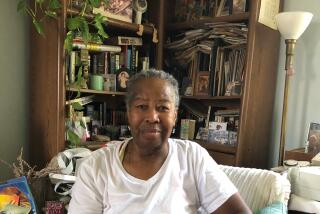Living in Deathly Fear of Shiley Valve’s Failure : Courts: First recipient to testify in suit tells of constant dread and vivid nightmares of device failing. ‘I dream I explode,’ she says.
- Share via
SANTA ANA — A San Diego County woman implanted 13 years ago with a potentially defective artificial heart valve told an Orange County Superior Court jury Thursday that she lives in constant dread and has vivid nightmares.
Ruth Barillas, a 54-year-old former bank clerk with a history of heart problems, testified during her suit against the Irvine-based maker of the heart valve, Shiley Inc., and its parent, Pfizer Inc. in New York.
She is the first recipient of the controversial Bjork-Shiley Convexo-Concave Heart Valve to take the device’s maker to task before a jury. In her first public statement since she filed suit last year, the Mexican-born Barillas described in detail the emotional storms she says she must weather daily.
“Sometimes I dream I explode,” she said softly. “And at the same time I say, ‘Oh, my valve!’ Then I wake up and say, ‘Thank God, it was only a dream.’ ”
Barillas says she suffers from deep depression and has been forced into an inactive life. Her husband, Constantino Barillas, 66, is also suing the company, alleging loss of marital relations. He, too, testified Thursday.
To win the case, the Barillases’ lawyers must prove that Shiley committed fraud or was negligent by lying to heart specialists and downplaying in reports to federal regulators the tendency of the valve to malfunction.
The Shiley valve, which is held together by a tiny wire strut that occasionally snaps at a weld point, was invented in 1978. Approved for sale by the U.S. Food and Drug Administration in 1979, the valve was discontinued in 1986. As of January, 501 fractures had been reported to the FDA, with 164 survivors. Some Shiley critics, including the Washington consumer rights group Public Citizen, estimate that as many as 900 of the 86,000 Shiley valve recipients worldwide have died because of valve failure.
Shiley attorneys vehemently deny that the company is guilty of fraud and insist that the valve, about the size of a quarter, is 99.9% safe. They also argue that Barillas’ emotional problems--she has been seeing a psychiatrist for more than a year--are more the result of marital and family problems than worries about the valve.
Barillas discovered during unrelated heart surgery in 1991 that she has a Shiley valve. Since then, she testified Thursday, though she has experienced no problems with the device, she has lived in terror, listening to the valve click-clack inside her chest and wondering if it will crack.
During Barillas’ testimony, jurors listened attentively as attorney Edward Kellogg led the plaintiff through a diary she kept from late 1990 to mid-1992.
Kellogg is seeking to show that Barillas’ mental state became increasingly worse after she learned about the potential for valve malfunction.
Though vowing to become more active in church functions and to take computer classes, Barillas wrote in March, 1992: “ . . . everybody says that I should let go of my negative thoughts and stop worrying about the Shiley valve, but that is more easy said than done.
“I feel upset that my depression does not go away. I pray that with time I will get better, sleep better and don’t feel so darn tired.”
Shiley attorneys are scheduled to cross-examine Barillas today.
That round of questioning is likely to be explosive, lawyers said, because Shiley attorney Pierce O’Donnell is expected to offer up for evidence several court and police records alleging that the Barillases’ two grown sons, Steven and Oscar, were involved in illicit drug use for several years, contributing to their mother’s mental anguish.
The Barillases both testified Thursday that they know of no criminal activity by their grown sons.
Constantino Barillas, a Guatemalan-born retired machinist, said that “we had a beautiful home, there’s no question about it.”
During cross-examination, Shiley attorney O’Donnell suggested that the couple were having problems unrelated to the Shiley valve. Constantino Barillas shot back: “I don’t accept that. She’s always been a good wife to me. I don’t think so.”
In other testimony Thursday, attorneys entered into evidence a taped deposition of Edward C. Bessey, president of Pfizer Hospital Products Group, which oversees Shiley.
During cross-examination, Bessey said that he looked into the Shiley controversy as soon as he took the reins of the division in 1982. He also testified that he and other executives under him “kept the Food and Drug Administration aware” of efforts to determine the valves’ risk and shared with the federal agency all information on fractures.
Bessey also testified that, despite the risk of strut fractures, the valve was still the best such device on the market at the time.
“This issue as I understand it . . . was a trade-off,” Bessey said, echoing Wednesday testimony in which Dr. Viking O. Bjork, the chief clinical investigator for Shiley, said that there was a 9% better chance of patients living normal lives with the Shiley convexo-concave valve than with earlier models.
More to Read
Inside the business of entertainment
The Wide Shot brings you news, analysis and insights on everything from streaming wars to production — and what it all means for the future.
You may occasionally receive promotional content from the Los Angeles Times.








